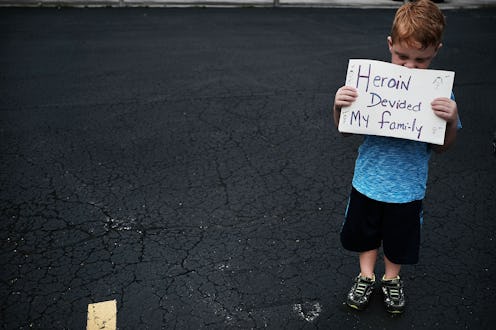News
Every 3 Weeks, The Opioid Crisis Kills As Many Americans As 9/11

The commission that the Trump Administration empowered to take on the opioid crisis has finished its interim report and it has a terrifying message for the president and the country as a whole: Drug overdoses kill as many Americans every 21 days as 9/11 did just once, and the majority of those deaths stem from the opioid crisis. Now the commission wants Trump to put a stop to it.
That's a daunting number — just shy of 3,000 deaths every three weeks — and it's led the commission to request that Trump declares a national emergency in response. "The first and most urgent recommendation of this Commission is direct and completely within your control," New Jersey Governor Chris Christie wrote in the report. He left no doubt about the urgency of the matter:
142 Americans die every day from a drug overdose. Our citizens are dying. We must act boldly to stop it. The opioid epidemic we are facing is unparalleled. The average American would likely be shocked to know that drug overdoses now kill more people than gun homicides and car crashes combined.
If the 9/11 statistics don't fully capture the devastation for you, the CDC's most recent numbers from 2015 show that 53,000 Americans died of drug overdoses. Of those, 33,000 are opioid overdoses — a combination of heroin and prescription drugs. That is more than two-thirds of all drug overdose deaths.
Interestingly, one of the main recommendations of the report is to use Medicaid to help people suffering with substance abuse. Currently, as the report points out, the Social Security Act limits the money that the federal government can pay for in-patient facilities that are treating mental disorders, including substance use disorders. States are then on the line to pay for it all, and the report suggests that the president works to change that, allowing increased Medicaid funding to cover this life-saving treatment.
Ultimately Congress would need to rewrite the law to allow for this funding, but the commission argues that the Department of Health and Human Services could offer waivers to states if the president issues the national emergency. "This is the single fastest way to increase treatment availability across the nation," the group wrote.
In addition to the Medicaid funding, the commission is pushing for education of doctors and dentists across the country who may be overprescribing painkillers, not knowing the potential for addiction. "This can and must be solved by using Presidential moral and legal authority to change this lack of education leading to addiction and death," the commission recommended.
There are many other technical suggestions that could take place under a presidential national emergency, and the commission has made that clear in its ask of the president:
Your declaration would empower your cabinet to take bold steps and would force Congress to focus on funding and empowering the Executive Branch even further to deal with this loss of life. It would also awaken every American to this simple fact: If this scourge has not found you or your family yet, without bold action by everyone, it soon will.
Given the attention that the Trump Administration has given the opioid crisis, and the degree to which it affects his supporters, there is hope that he will heed the call of his commission and make these bold moves to protect vulnerable Americans. Their families are counting on it.